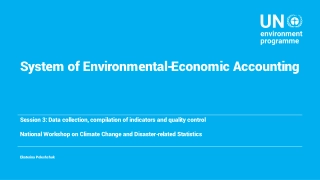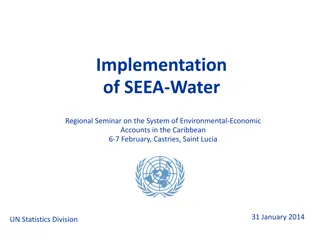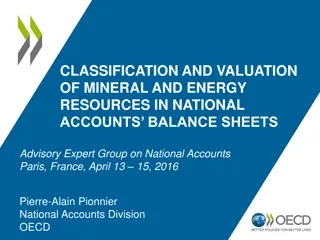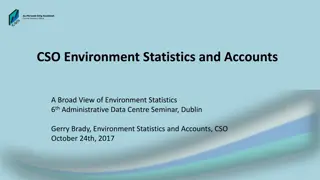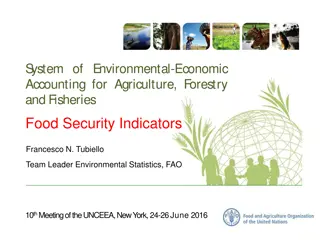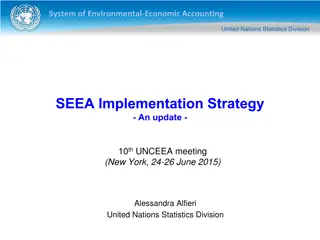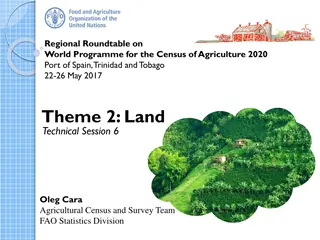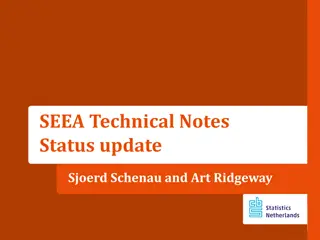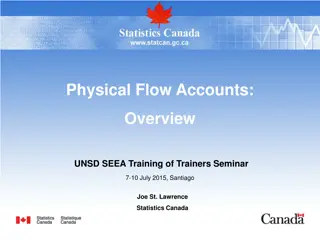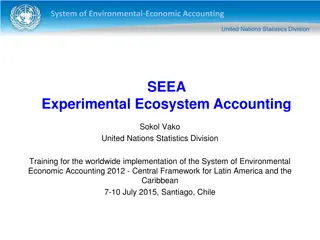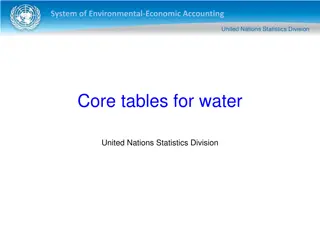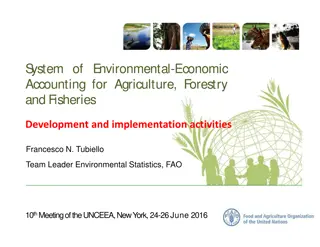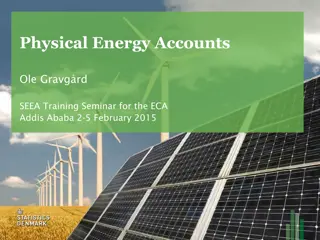Understanding the System of Environmental-Economic Accounting (SEEA)
The System of Environmental-Economic Accounting (SEEA) is a framework that combines economic and environmental data to offer a comprehensive view of the connection between the economy and the environment. It includes standard concepts, definitions, and classifications for producing internationally c
108 views • 11 slides
System of Environmental-Economic Accounts for Water Management in the Caribbean
This seminar focused on implementing the SEEAW to address water-related challenges in the Caribbean region. It highlighted the importance of measuring progress towards water policy objectives, including water security, supply management, quality improvement, and adaptation to extreme events. The SEE
0 views • 27 slides
Mineral and Energy Resources Classification and Valuation in National Accounts Balance Sheets
The presentation discusses the classification and valuation of mineral and energy resources in national accounts balance sheets, focusing on the alignment between the System of Environmental-Economic Accounting (SEEA) and the System of National Accounts (SNA) frameworks. It highlights the need for a
0 views • 17 slides
Eurostat Environmental Economic Accounts and Statistics Overview
The presentation discusses Eurostat's Environmental Economic Accounts and Statistics, outlining modules, questionnaire details, methodological approach, and statistical collaboration. Key topics include air emission accounts, environmental taxes, material flow accounts, and more. The focus is on ach
2 views • 19 slides
Enhancing Food Security Through Environmental-Economic Accounting in Agriculture
Connecting the System of Environmental-Economic Accounting (SEEA) with Food Security Indicators is crucial for achieving sustainable agriculture and ending hunger. The FAO has developed a set of indicators to measure different dimensions of food security, including availability, access, stability, a
0 views • 17 slides
System of Environmental-Economic Accounting: Implementation and Policy Landscape
This article delves into the implementation strategy and policy landscape of the System of Environmental-Economic Accounting (SEEA), highlighting key endorsements, frameworks, and initiatives such as SDG integration, green economy strategies, SCP alignment, data initiatives, and the importance of ge
0 views • 20 slides
Insights into Land Use and Agricultural Census: Regional Roundtable on World Programme for the Census of Agriculture 2020
Explore the crucial theme of land use and its significance in agricultural census analysis, including the updated classification aligned with SEEA. Learn about the essential items at both holding and parcel levels, emphasizing the importance of accurate data for policy-making and understanding land
0 views • 22 slides
SEEA Technical Notes Status Update by Sjoerd Schenau and Art Ridgeway
SEEA Technical Notes provide guidance and support for the implementation of the System of Environmental-Economic Accounting (SEEA). The notes cover various topics related to environmental-economic accounts and tables, with a focus on key policy issues. The work process involves input from the SEEA t
0 views • 12 slides
Understanding Physical Flow Accounts and Environmental-Economic Framework
Explore the significance of physical flow accounts, the economy, and the environment within the framework of the System of National Accounts (SNA) and the System of Environmental-Economic Accounts (SEEA). Learn about material consumption, energy use analysis, environmental assessment, and more. Gain
0 views • 26 slides
Partnership Opportunities between SEEA and IUCN in Sustainable Development
Explore the potential collaboration between SEEA and IUCN to advance sustainable development goals through initiatives like Global Sustainability Targets, Biodiversity Monitoring, and the Natural Capital Protocol. Discover how synergies between SEEA and IUCN can drive progress in environmental conse
0 views • 7 slides
System of Environmental-Economic Accounting and Experimental Ecosystem Accounting Overview
The System of Environmental-Economic Accounting (SEEA) and Experimental Ecosystem Accounting aim to integrate biophysical data, monitor ecosystem changes, and link them to economic activities. They provide a framework for accounting for ecosystem assets and services, playing a crucial role in the po
0 views • 34 slides
System of Environmental-Economic Accounting Core Tables for Water
System of Environmental-Economic Accounting (SEEA) provides core tables and accounts focusing on water accounting and other environmental aspects. The core tables offer concise and relevant information essential for deriving indicators and formulating evidence-based public policies. These tables aim
0 views • 15 slides
Development of System of Environmental-Economic Accounting for Agriculture, Forestry, and Fisheries
The System of Environmental-Economic Accounting for Agriculture, Forestry, and Fisheries (SEEA-Agriculture) initiative by FAO, in collaboration with UNSD, aims to construct relevant accounting tables and assess data availability for sustainable development. Pilot countries include Australia, Canada,
0 views • 20 slides
Understanding Physical Energy Accounts and SEEA for Economic Analysis
Physical Energy Accounts play a crucial role in analyzing energy use in the economy and its impact on the environment. The System of Environmental-Economic Accounting (SEEA) provides a methodology for describing energy flow using national accounts frameworks, including supply-use tables and asset ac
0 views • 18 slides
